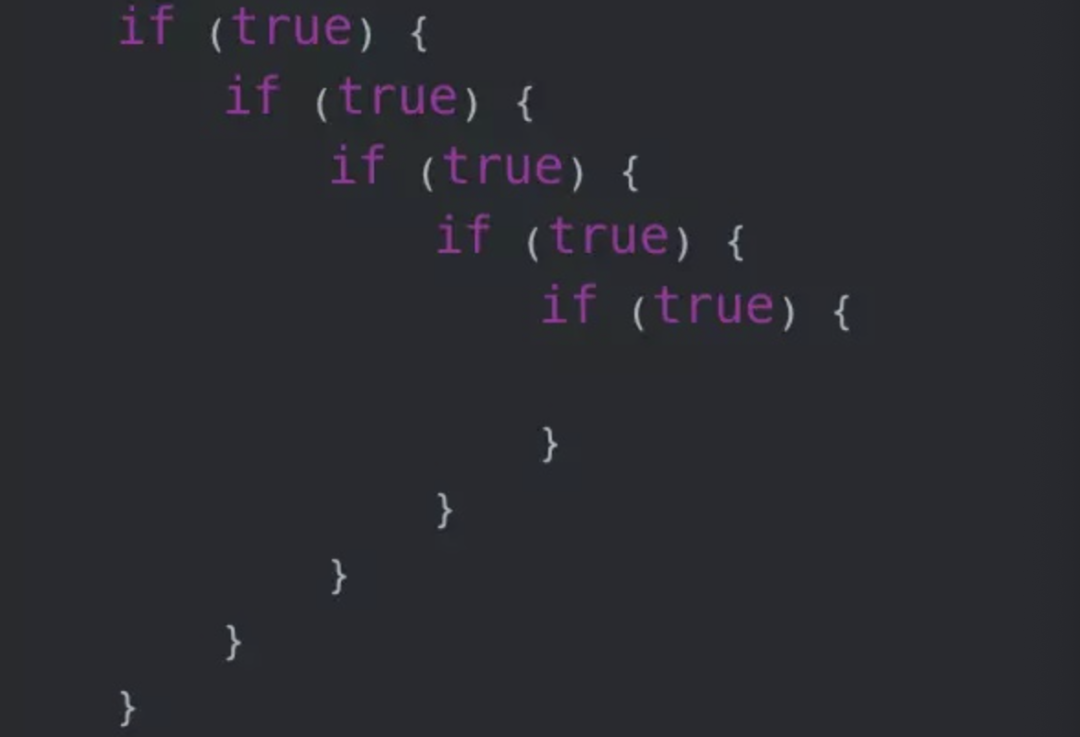代码中大量的if/else,你有什么优化方案?
来自:IT技术控
原文链接地址:https://www.zhihu.com/question/344856665/answer/816270460
观点一(灵剑):
前期迭代懒得优化,来一个需求,加一个if,久而久之,就串成了一座金字塔。

当代码已经复杂到难以维护的程度之后,只能狠下心重构优化。那,有什么方案可以优雅的优化掉这些多余的if/else?
1. 提前return
这是判断条件取反的做法,代码在逻辑表达上会更清晰,看下面代码:
if (condition) {
// do something
} else {
return xxx;
}
其实,每次看到上面这种代码,我都心里抓痒,完全可以先判断!condition,干掉else。
if (!condition) {
return xxx;
}
// do something
2. 策略模式
有这么一种场景,根据不同的参数走不同的逻辑,其实这种场景很常见。
最一般的实现:
if (strategy.equals("fast")) {
// 快速执行
} else if (strategy.equals("normal")) {
// 正常执行
} else if (strategy.equals("smooth")) {
// 平滑执行
} else if (strategy.equals("slow")) {
// 慢慢执行
}
看上面代码,有4种策略,有两种优化方案。
2.1 多态
interface Strategy {
void run() throws Exception;
}
class FastStrategy implements Strategy {
@Override
void run() throws Exception {
// 快速执行逻辑
}
}
class NormalStrategy implements Strategy {
@Override
void run() throws Exception {
// 正常执行逻辑
}
}
class SmoothStrategy implements Strategy {
@Override
void run() throws Exception {
// 平滑执行逻辑
}
}
class SlowStrategy implements Strategy {
@Override
void run() throws Exception {
// 慢速执行逻辑
}
}
具体策略对象存放在一个Map中,优化后的实现
Strategy strategy = map.get(param);
strategy.run();
上面这种优化方案有一个弊端,为了能够快速拿到对应的策略实现,需要map对象来保存策略,当添加一个新策略的时候,还需要手动添加到map中,容易被忽略。
2.2 枚举
发现很多同学不知道在枚举中可以定义方法,这里定义一个表示状态的枚举,另外可以实现一个run方法。
public enum Status {
NEW(0) {
@Override
void run() {
//do something
}
},
RUNNABLE(1) {
@Override
void run() {
//do something
}
};
public int statusCode;
abstract void run();
Status(int statusCode){
this.statusCode = statusCode;
}
}
重新定义策略枚举
public enum Strategy {
FAST {
@Override
void run() {
//do something
}
},
NORMAL {
@Override
void run() {
//do something
}
},
SMOOTH {
@Override
void run() {
//do something
}
},
SLOW {
@Override
void run() {
//do something
}
};
abstract void run();
}
Strategy strategy = Strategy.valueOf(param);
strategy.run();
3. 学会使用 Optional
if (user == null) {
//do action 1
} else {
//do action2
}
Optional userOptional = Optional.ofNullable(user);
userOptional.map(action1).orElse(action2);
4. 数组小技巧
int getDays(int month){
if (month == 1) return 31;
if (month == 2) return 29;
if (month == 3) return 31;
if (month == 4) return 30;
if (month == 5) return 31;
if (month == 6) return 30;
if (month == 7) return 31;
if (month == 8) return 31;
if (month == 9) return 30;
if (month == 10) return 31;
if (month == 11) return 30;
if (month == 12) return 31;
}
int monthDays[12] = {31, 29, 31, 30, 31, 30, 31, 31, 30, 31, 30, 31};
int getDays(int month){
return monthDays[--month];
}
结束
观点二(IT技术控):
评论
